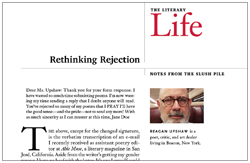Poets & Writers Magazine welcomes letters from its readers. Please post a comment on select articles at www.pw.org/magazine, e-mail editor@pw.org, or write to Editor, Poets & Writers Magazine, 90 Broad Street, Suite 2100, New York, NY 10004. Letters accepted for publication may be edited for clarity and length.
 Back on That Horse
Back on That Horse
I want to thank Reagan Upshaw for his article “Rethinking Rejection: Notes From the Slush Pile” (May/June 2015). “I arrived to prison in 1997 at the age of nineteen.” Each time I submit work, my cover letter begins with that line. Imagine the thoughts of an editor receiving a large envelope boldly stamped THIS LETTER HAS BEEN MAILED FROM A CORRECTIONAL INSTITUTION, and then reading that first line. Even with the competition stacked against me, I still submit. My need to be heard overpowers my fear of rejection. Receiving an SASE with only a scrap of paper compels me to climb back up on that unbreakable horse. Over the years I’ve discovered that if one works hard and continues submitting, that horse will kick its rider off countless more times, but supportive little notes will come. And my work will be published…eventually.
Sean J. White
New Lisbon, Wisconsin
Reading “Rethinking Rejection” in the latest
@poetswritersinc after having received my latest rejection, and feeling oddly comforted.
Stephauteri
@stephauteri
Writers, Reagan Upshaw has wise words on rejection in @poetswritersinc.
TheStoneslide
@TheStoneslide
Discover Great New Poets
After reading Cat Richardson’s interview with Miwa Messer (“Miwa Messer’s Great New Writers,” May/June 2015), I wonder why Barnes & Noble doesn’t consider poetry for its Discover Great New Writers program. It would go a long way toward validating contemporary poetry with the reading public if Barnes & Noble were to recognize that many poets are publishing phenomenal work.
Excerpted from a comment on pw.org by SSousa
Considering Contests
“The Judges” (May/June 2015) confirmed my experience submitting poems to periodicals and contests over a long period of time. In the 1980s and 1990s, I received one acceptance for every fourteen poems I submitted. Now, it’s more like one for every forty-eight. I attribute this change to the proliferation of MFA programs, which churn out standardized products that flood literary publications, and to editors who operate under the delusion that submission number 4,000 will be perfect, when number 148 has an equal chance of doing the job. Editors should declare a reading period of one month, or limit readings to the first two hundred submissions received. What we read in publications these days is the “MFA voice” over and over. You can’t tell where one writer begins and the other ends. We’re overdue for a revolution.
Sharon Scholl
Atlantic Beach, Florida






